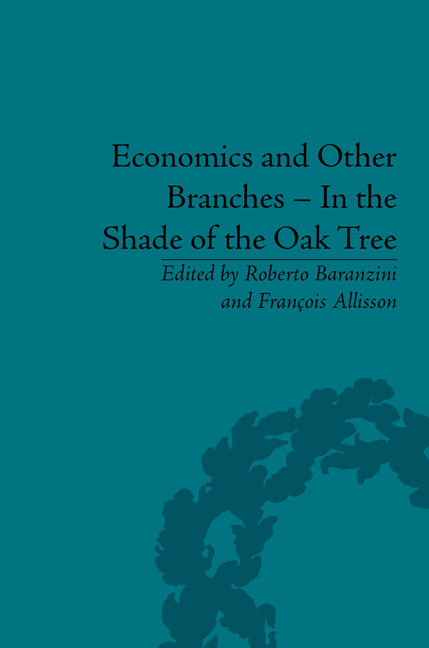Book contents
- Frontmatter
- CONTENTS
- List of Contributors
- List of Figures and Tables
- Introduction
- Pascal Bridel's Bibliography (up to 2013)
- Part I Léon Walras's Economic Thought
- Part II The Spreading of Thought
- Léon Walras's Reception
- The Lausanne School
- French Matters
- Cambridge UK
- Part III Monetary Theory
- Part IV Methodology
- Part V Economics and Humanities
- Economics and Social Sciences
- Some Insights from Visual Arts
- Part VI Economics and Civil Society
- 28 A Reflection on the Social Utility of Modern Macroeconomics
- 29 Failing to Control: Accountability in Historical Perspective
- 30 Does Transparency Engender the Confidence of the Governed? A Contribution to Political Thought
- 31 Face to the Environmental Challenge: Straddling the Fence between Social Responsibility and Penal Responsibility
- 32 Law as a System of Normative Production: Law and Semiotics
- Notes
- Index
31 - Face to the Environmental Challenge: Straddling the Fence between Social Responsibility and Penal Responsibility
from Part VI - Economics and Civil Society
- Frontmatter
- CONTENTS
- List of Contributors
- List of Figures and Tables
- Introduction
- Pascal Bridel's Bibliography (up to 2013)
- Part I Léon Walras's Economic Thought
- Part II The Spreading of Thought
- Léon Walras's Reception
- The Lausanne School
- French Matters
- Cambridge UK
- Part III Monetary Theory
- Part IV Methodology
- Part V Economics and Humanities
- Economics and Social Sciences
- Some Insights from Visual Arts
- Part VI Economics and Civil Society
- 28 A Reflection on the Social Utility of Modern Macroeconomics
- 29 Failing to Control: Accountability in Historical Perspective
- 30 Does Transparency Engender the Confidence of the Governed? A Contribution to Political Thought
- 31 Face to the Environmental Challenge: Straddling the Fence between Social Responsibility and Penal Responsibility
- 32 Law as a System of Normative Production: Law and Semiotics
- Notes
- Index
Summary
Introduction
The modern ecological critique appeared mainly in the 1960s, along with the new social movements. But it is since the 2000s that the damage (or negative externalities, in economic terms) caused by companies to the environment have been most publicized. Now, with the web, image issues are so crucial that no company can afford to ignore them. NGOs therefore have a powerful tool at their disposal and they could use it as a credible threat against groups that tried to pursue a type of growth undermining the environment. However, NGOs are claiming for further guarantees: if they can indeed get results – getting harmful operations to be discontinued, for example – it is through their actions, their denunciations but also and especially thanks to the media exposure they manage to get, mostly via social networks. Should we settle for such a system?
This question lies at the heart of debates about corporate social responsibility (CSR). Translated from the American concept of ‘Corporate Social Responsibility’, CSR was defined in 2001 by the European Commission's ‘Green Paper’ as the ‘companies’ voluntary integration of social and environmental concerns in their business operations and their relationships with stakeholders'. At the 2002 Earth Summit in Johannesburg, CSR was one of the main topics. Large companies active in the fields of the environment and energy participated.
- Type
- Chapter
- Information
- Economics and Other Branches – In the Shade of the Oak TreeEssays in Honour of Pascal Bridel, pp. 435 - 448Publisher: Pickering & ChattoFirst published in: 2014



